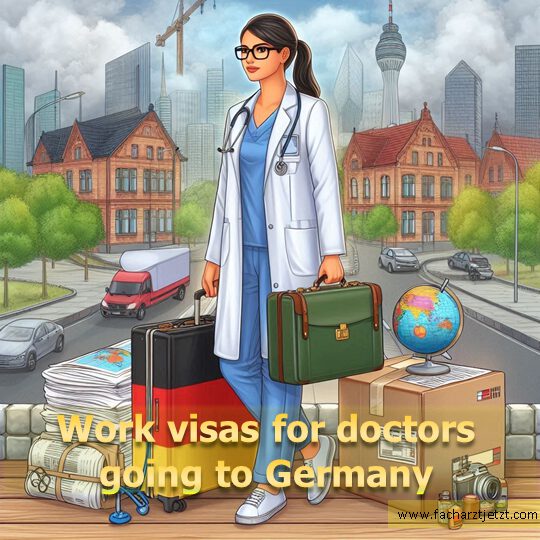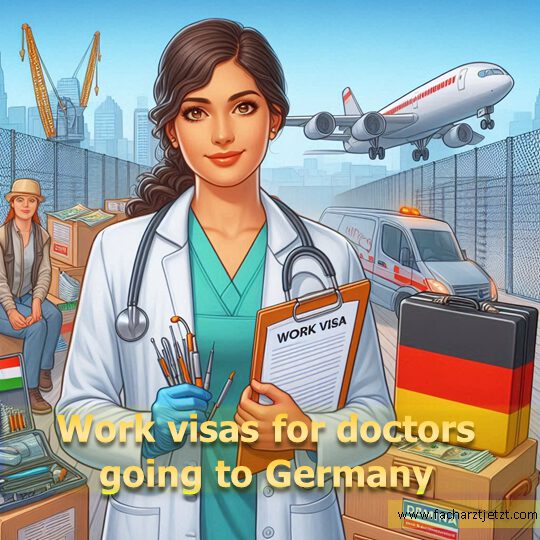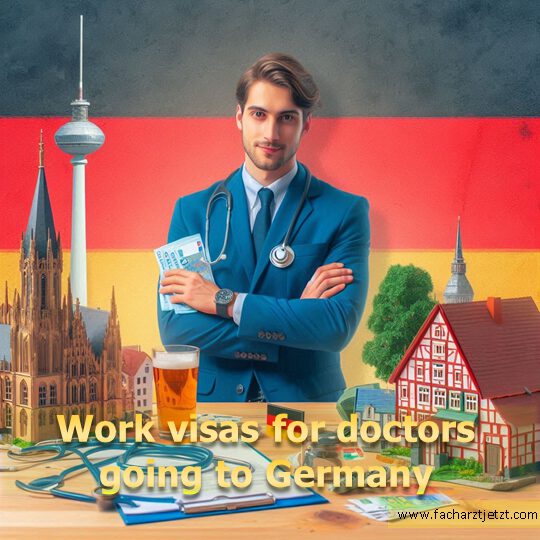
• Introduction
Germany offers a range of visa options to help expats enter the country. The main visa type for International Medical Graduates (IMGs) is called the Visa for Recognition of Professional Qualification (§16D). A work visa is an excellent alternative to this visa type. In this article, I will explain the pros and cons of getting a work visa, the three main types of work visas, and how you can apply for each one. The 10 steps for getting a medical residency in Germany are explained here.
• A German recruiting expert can help doctors with Approbation get a job for free. Click JETZT: here.
• If you have any doubts or need more clarification, feel free to ask any time in the main group of Facharzt JETZT on Facebook and Telegram (all Telegram groups will be added as a folder).
• This article is a guide to enhance your understanding of the topic; however, it should not be your sole resource. Always consult official websites for the most accurate and up-to-date information (you can read our full disclaimer here).
• Pros of the work visa pathway: Why consider this visa type?
- Better Finances: You can earn a higher income than with the part-time jobs allowed under the 16D or Study Visa, enabling you to live comfortably and even send money back home.
- No Blocked Account Requirements: The most significant expense when moving to Germany is the amount you need to show for your upkeep at the embassy during your visa appointment. As of 2024, this would cost you €11.904/year (€992/month). Thanks to your work contract, you don’t need to provide this when applying for a work visa.
- An Effective Distraction While Waiting for Approbation: Of course, you might argue that it’s better to fully focus on studies while waiting for 1-2 years to get your Approbation, but having a job can reduce the anxiety of being dependent on your blocked account money for survival while enduring the long waiting times for appointments. And sadly, some candidates may need to retake exams, adding more time and costs.
• Cons of the work visa pathway
- Difficulty in Finding a Job: As you’ve probably heard, “Finding a job is a full-time job itself,” and it gets harder when searching from abroad. This is the biggest hurdle on this path.
- Long Wait for the Visa: Haben Sie Geduld! (German for: Be patient). Patience is key! Depending on the work visa type, your home country’s embassy, and whether your employer fast-tracks the process, the wait can be up to a year before you set foot in Germany.
- Less Free Time for Exam Preparation: Remember, your goal is to become a licensed doctor in Germany. Balancing work and exam preparation can be really challenging.
Still interested in this pathway? Cool! Let’s proceed.
• The three main types of work visas you can apply for as a doctor:
1. EU Blue Card (§18g)
2. Visa for Qualified Professionals (§18b)
3. Visa for Professionally Experienced Workers (§19c)
Building on my assumptions that you have your MBBS and a license to practice medicine (preferably from your country of study), here are some tips to ensure success on this path:
- Get a job offer: In the following section, I will explain the kind of job roles that are accepted
- Get at least a B2 certification of the German language (English certificates are NOT a plus)

• Job types are two:
For simplicity, I will divide the job types into 2 categories:
• Category 1: Non-Regulated Medical Professions
These include various jobs such as:
– Doctor’s Assistant (German: Medizinische Fachangestellte – MFA)
– Clinical Research Assistant (German: Hilfswissenschaftler*in)
– Clinical Trial Assistant
– Clinical Research Coordinator
Typical Tasks: Blood draws, setting lines, documentation, assisting with laboratory investigations, ECGs, EEGs, etc.
• Types of work visa:
There are three main types of work visas applicable to this category and each one has its own requirements. Apply for the one that mostly suit your situation. The three types of work visas are:
• Type 1: EU Blue Card (§18g)
- Minimum gross salary of €45,300.
- Statement of comparability from ZAB.
• What is ZAB?
In Germany, ZAB stands for Zentralstelle für ausländisches Bildungswesen, which translates to Central Office for Foreign Education. It is part of the Kultusministerkonferenz (Standing Conference of the Ministers of Education and Cultural Affairs) and is responsible for the recognition of foreign educational qualifications. The ZAB evaluates and assesses foreign academic degrees, diplomas, and certificates to determine their equivalence to German educational standards. If you have completed studies abroad and want to work or further study in Germany, ZAB can issue a formal recognition of your qualifications, known as an Statement of Comparability (Zeugnisbewertung). This is often a necessary step for accessing professional jobs, higher education, or regulated professions in Germany. In summary: ZAB plays a key role in the recognition of foreign academic and professional qualifications. Its evaluations help individuals with foreign credentials integrate into the German job market or educational system. To apply for the recognition of foreign qualifications through the ZAB (Zentralstelle für ausländisches Bildungswesen) in Germany, you need to follow a specific process. Here’s a step-by-step guide on how to apply:
1. Check If You Need Recognition Before applying, ensure that your qualification requires recognition. Certain professions in Germany, especially regulated ones (like doctors, teachers, and engineers), need formal recognition. You can check this through the Recognition in Germany website (run by the German government) to see if your qualification is regulated.
Note: This recognition is different from the professional recognition, Gutachten, as a successful Gutachten can exempt you from having to take KP, whereas this Zeugnisbewertung simply compares the quality of any university degree to German standards, regardless if it is for a non-regulated or a regulated job.
2. Gather the Required Documents Prepare the necessary documents for the application. The ZAB typically requires:
- Proof of identity (passport or ID card).
- Diplomas or certificates: Official copies of your foreign qualification(s), translated into German by a certified translator.
- Academic transcripts with grads: Detailed information about your studies, including subjects and grades.
- Proof of professional experience: (if relevant), like certificates of employment. An employment contract or written job promise from a German employer will expedite the process. Check with ZAB’s official website for the exact requirements as they may differ depending on your qualification and country of origin.
3. Prepare Translations (if needed): Any documents not originally in English or German will need to be translated by a certified translator in Germany. Make sure to use an officially recognized translator.
4. Apply Online: You can apply for the recognition of your qualifications directly through the ZAB’s online platform. Do not send any documents via Post except you have been asked to do so.
5. Pay the Fees There is a fee for the evaluation of foreign qualifications. As of 2024, the fee is €208 for an individual assessment. Payment details will be provided during the application process.
6. Wait for Processing: As per their website, a time frame of at least 3 months is to be expected. Be prepared for potential delays, if additional information or documents are needed.
7. Receive the Statement of Comparability: Once the ZAB has processed your application, they will notify you via email and also issue a PDF document containing your Zeugnisbewertung. This document will outline how your foreign qualification compares to a German one. It can then be used when applying for jobs, work visas, further education, or EU Blue Card.
• Type 2: Visa for Qualified Professionals (§18b)
- Statement of comparability (of your MBBS) from ZAB.
- No salary threshold unless you are 45 or older.
• Type 3: Visa for Professionally Experienced Workers (§19c)
- 2 years of relevant working experience in the last 5 years.
- Minimum gross salary of €40,770 (2024).
• Category 2: IT jobs
Doctors with experience in the IT sector can qualify for a work permit with a relevant job offer. Common fields include software development, data science, health informatics, digital health, cybersecurity, project management, and more.

• The three available work permits:
You can apply for any of these visas provided you meet the requirements.
1. EU Blue Card (§18g)
- A degree matching your IT job OR 3 years of work experience in the last 7 years
- Minimum gross salary of €41,042 (2024)
2. Visa for Qualified Professionals (§18b)
- Statement of comparability (of your MBBS) from ZAB
- No salary threshold unless you are 45 of age or older
3. Visa for Professionally Experienced Workers (§19c)
- 2 years of relevant working experience in the last 5 years
- Minimum gross salary of €40,770 (2024)
• Final Thoughts
I know this is a lot to take in, but having multiple options is always a good thing.
If you would prefer to come to Germany to look for a job, you can apply for the Opportunity Card. This could be explained in another article, but a Google search might help you too.
Viel Glück auf Ihrem Weg! (a lot of luck on your pathway)
• Thanks to the author of this article: Fortune Okafor
Want to learn more? Questions?
Join JETZT (🇺🇸 now) all of our groups & ask what you like
(On mobile phone: The links are at the end of this page/ On PC: On the right side)